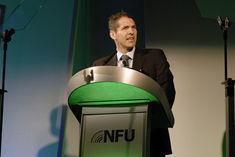
A series of events are being held at universities and colleges around the UK to encourage students to see agricultural research as a viable career path and explore some of the challenges faced in this area.
The seminars, which follow the National Farmers' Union’s Why Science Matters campaign, will each focus on different aspects of the need for and use of science in agriculture. Topics to be covered include diseases relevant to the dairy industry, crop genetic improvement and the role of new technologies such as anaerobic digestion and biotechnology on farm, as well as science’s role in enabling farming businesses to prosper as part of a successful rural economy in the UK.
There will be presentations from farmers, industry figures and scientists including those who are relatively early on in their academic careers. A key part of the seminars will be the opportunity for the student-based audiences to ask questions and debate the issues raised.
Dr Helen Ferrier, the NFU’s chief science and regulatory affairs adviser, said: “We want to engage with the next generation of agricultural scientists, particularly in applied research, as the pool of experts is diminishing at a worrying rate. Farming is a high-tech industry and it’s important that we can try to communicate this message to students in further education who are studying subjects like agriculture, science and engineering and who want to work in an industry that will use their skills.
“We also have to try to compete against the likes of the pharmaceutical, automotive and information technology industries for the wealth of talent and enthusiasm that is out there.”
NFU vice president Paul Temple, who will be speaking at the first seminar at the University of Reading, said: “I want to see a reversal of the trend of under-investment in agricultural research and development that we’ve seen over the past two decades. The cuts in funding are inconsistent with the demands on production in the 21st century and also threaten the UK’s position as a world leader in many areas of science related to farming, such as animal health.
“The government has a crucial role to play at all levels and I would urge it to shift its policies and priorities to recognise the needs of productive and efficient agriculture as we farm in a changing world, while meeting all our environmental responsibilities. The agricultural research and extension community needs to receive the right signals to do the science and translate it into practice on the ground.”
Why Science Matters for Farming was officially launched at the House of Commons in October last year and is a celebration of the advances in farming practice and food production that have been possible due to the application of science and technology to agriculture and horticulture. It also raises awareness of the current state of agricultural science and research in the UK, and the challenges that exist in translating science into practice on farm.



